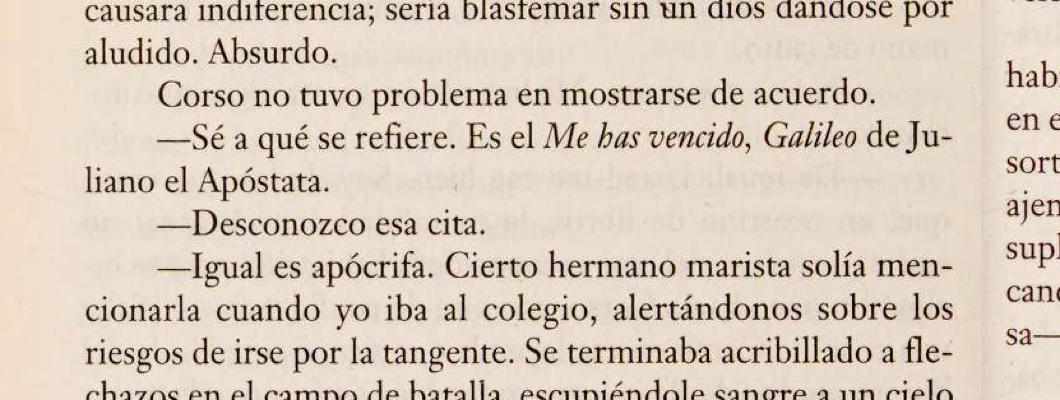
About Andrew Cusack
 Writer, web designer, etc.; born in New York; educated in Argentina, Scotland, and South Africa; now based in London.
Writer, web designer, etc.; born in New York; educated in Argentina, Scotland, and South Africa; now based in London. read more
News
Blogs
Reviews & Periodicals
Arts & Design
World
France
Mitteleuropa
Knickerbockers
Argentina
The Levant
Africa
Cape of Good Hope
Netherlands
Scandinavia
Québec
India
Muscovy
Germany
Academica

Mistranslating Apostates
ONE OF THE historical anecdotes I enjoyed being taught at school was the death of the Emperor Julian the Apostate — as relayed by our much-esteemed teacher Dr Nathaniel Kernell. This was in the Christian era with the capital at Constantinople rather than the Eternal City itself — Julian had (as betokened by his moniker) abandoned Christianity aged 20 and sought to frustrate its spread.
He wanted to promote the old Greek gods, dabbled in vegetarianism, and even tried to rebuild the Temple of Jerusalem. Mysterious fires consumed the workers tasked with that final project and it is presumed many Jews didn’t want to be dragged into the Emperor’s political project the animus of which was opposition to Christianity rather than promotion of Judaism.
Anyhow, none of Julian’s projects came to much fruition and as he lay dying from an injury in battle, the apostate emperor realised the futility of his life’s work with his final words: νενίκηκάς με, Γαλιλαῖε, or ‘Thou hast defeated me, Galilean!’

At the moment I am reading a book by Arturo Pérez-Reverte and stumbled across a mistranslation from the Spanish that would have been avoided if only the translator had enjoyed the privilege of being taught by Dr Kernell.
It turns out that the Spanish word for ‘Galilean’ is ‘Galileo’. Pérez-Reverte’s translator, alas, failed to understand one of the characters reference to Julian’s final words and mistook Christ our Saviour for an Italian astronomer, mistranslating the phrase as “You have defeated me, Galileo”.
Worth a wry smile, given the solid 1,200-year gap between the death of Julian the Apostate and the birth of Galileo Galilei.

The Dumas Club is a delightfully weird and intriguing tale, though, and I look forward to reading more by Pérez-Reverte — no matter who the translator is.
Search
Instagram: @andcusack
Click here for my Instagram photos.Most Recent Posts
- Articles of Note: 27 January 2025 January 27, 2025
- Spooks’ Crown January 23, 2025
- Jesuit Gothic January 23, 2025
- Christ Church December 29, 2024
- A Christmas Gift from the Governor December 24, 2024
Most Recent Comments
Book Wishlist
Monthly Archives
Categories



That made me laugh and cry. We are in for a long winter and a glorious spring.
“it is presumed many Jews didn’t want to be dragged into the Emperor’s political project the animus of which was opposition to Christianity rather than promotion of Judaism”
Do you have any basis for this presumption?
Possibly just deductive logic, or maybe Wikipedia — can’t remember.